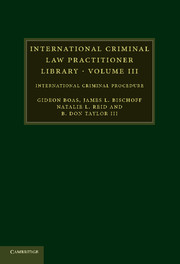Book contents
- Frontmatter
- Contents
- Foreword
- Table of authorities
- Table of short forms
- 1 The nature of international criminal procedure
- 2 Creation and amendment of rules of international criminal procedure
- 3 Procedures related to primacy and complementarity
- 4 Investigations, rights of suspects, and detention
- 5 Defence counsel, amici curiae, and the different forms of representation of accused
- 6 Pre-trial proceedings
- 7 Trial proceedings
- 8 The role and status of victims in international criminal procedure
- 9 Evidence
- 10 Judgement and sentencing
- 11 Appeal and revision
- 12 Conclusion
- Index
Foreword
Published online by Cambridge University Press: 05 August 2011
- Frontmatter
- Contents
- Foreword
- Table of authorities
- Table of short forms
- 1 The nature of international criminal procedure
- 2 Creation and amendment of rules of international criminal procedure
- 3 Procedures related to primacy and complementarity
- 4 Investigations, rights of suspects, and detention
- 5 Defence counsel, amici curiae, and the different forms of representation of accused
- 6 Pre-trial proceedings
- 7 Trial proceedings
- 8 The role and status of victims in international criminal procedure
- 9 Evidence
- 10 Judgement and sentencing
- 11 Appeal and revision
- 12 Conclusion
- Index
Summary
This is the third volume in the International Criminal Law Practitioner Library Series. Volumes I and II dealt with substantive international criminal law, particularly forms of individual criminal responsibility and the core crimes of genocide, crimes against humanity and war crimes. The present volume is devoted to international criminal procedure, the most controversial and most important aspect of international criminal law.
While substantive international criminal law is accepted as a branch of international law, doubts have been raised as to whether there is a body of law that can legitimately be called international criminal procedure. In large measure these doubts arise from the fact that international criminal procedure embraces both the accusatorial system of the common law and the inquisitorial system of the civil law. The argument is made that it lacks coherence and certainty because these two systems are as yet still engaged in a struggle for supremacy. The present careful and comprehensive study of the rules and principles of international criminal procedure refutes this argument and shows convincingly that international criminal procedure is a sui generis system, with a common foundational source – international human rights law and the basic norm of the right to a fair trial.
The authors accept that different international criminal courts are governed by different rules under their different founding Statutes. Indeed, much of the study is dedicated to comparing and contrasting these differences.
- Type
- Chapter
- Information
- International Criminal Law Practitioner LibraryInternational Criminal Procedure, pp. xiv - xviiPublisher: Cambridge University PressPrint publication year: 2011

